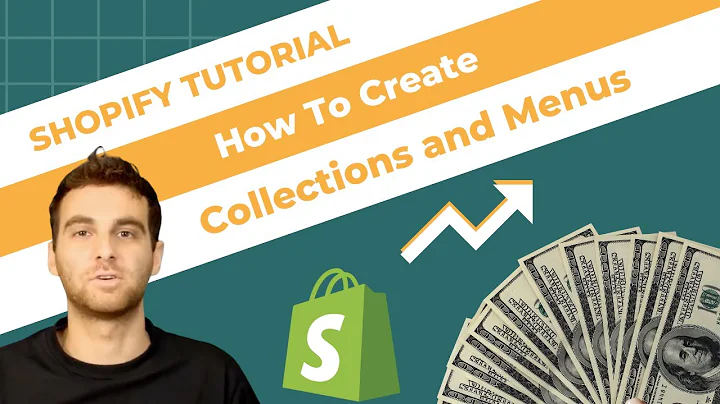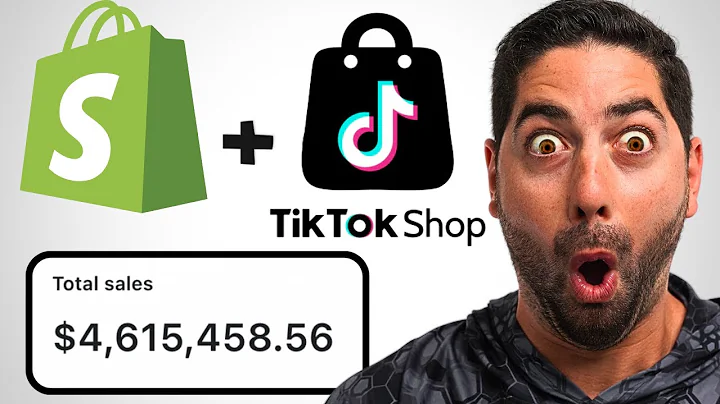Etsy vs Shopify: Which Platform is Right for You?
Table of Contents
- Introduction
- Understanding Etsy
- What is Etsy?
- Benefits of Selling on Etsy
- Drawbacks of Selling on Etsy
- Understanding Shopify
- What is Shopify?
- Benefits of Using Shopify
- Drawbacks of Using Shopify
- Comparing Etsy and Shopify
- Target Audience
- Cost and Fees
- Traffic and Marketing
- Customization and Branding
- Choosing the Right Platform for You
- Determining Your Business Goals
- Evaluating Your Product and Target Audience
- Assessing Your Marketing and Advertising Skills
- Considering Long-Term Growth
- Transitioning from Etsy to Shopify
- Building a Strong Brand on Etsy
- Redirecting Traffic to Your Shopify Store
- Ensuring Compliance with Etsy's Rules
- Promoting Your Shopify Store
- Conclusion
Etsy vs. Shopify: Which E-commerce Platform is Right for You?
Are you an aspiring online entrepreneur looking to set up your own e-commerce store? Do you find yourself debating between Etsy and Shopify? In this comprehensive guide, we will explore the differences between the two popular platforms and help you decide which one is the best fit for your business. So, let's dive in!
1. Introduction
The world of e-commerce offers endless opportunities for those who want to sell products or services online. With the rise in popularity of online shopping, it's essential to choose the right platform to establish your presence. Etsy and Shopify are two widely recognized e-commerce platforms, each with its own unique features and advantages.
2. Understanding Etsy
2.1 What is Etsy?
Etsy is an online marketplace that specializes in handmade, vintage, and unique items. It provides a platform for individual sellers to display and sell their products to a global customer base. Unlike Shopify, Etsy acts as a middleman, connecting sellers with potential buyers.
2.2 Benefits of Selling on Etsy
Etsy offers several benefits for sellers, including:
- Built-in customer base and traffic
- User-friendly interface for easy store setup
- Lower upfront costs compared to other platforms
- A sense of community and support for makers and artisans
2.3 Drawbacks of Selling on Etsy
While Etsy has its advantages, it also has some drawbacks that sellers should consider:
- Limited customization options for store design
- The presence of competitors with similar products
- Listing fees, transaction fees, and advertising costs can eat into profits
- Strict guidelines and policies that sellers must adhere to
3. Understanding Shopify
3.1 What is Shopify?
Shopify, on the other hand, is a standalone e-commerce platform that enables sellers to create and manage their own online stores. It provides a comprehensive set of tools and features that allow sellers to customize their stores, manage inventory, process payments, and more.
3.2 Benefits of Using Shopify
Shopify offers numerous advantages for online sellers, including:
- Complete control over store design and branding
- Integrated payment gateways for easy transactions
- Flexible pricing plans to suit different business needs
- Robust tools for inventory management, analytics, and marketing
3.3 Drawbacks of Using Shopify
While Shopify is a popular choice among entrepreneurs, it also has a few drawbacks to consider:
- Higher costs compared to Etsy, including monthly subscription fees
- Additional expenses for third-party apps and add-ons
- Requires more technical knowledge to set up and customize the store
- Limited built-in customer base, resulting in the need for active marketing efforts
4. Comparing Etsy and Shopify
4.1 Target Audience
Etsy primarily caters to individuals looking for unique, handmade, and vintage items. It attracts a specific niche audience who appreciates artisanal products. On the other hand, Shopify is ideal for businesses of all sizes and industries, offering a broader reach and targeting a more general customer base.
4.2 Cost and Fees
Etsy charges fees for listing products, each sale made, and additional paid services like advertising. Shopify, on the other hand, operates on a subscription model, with various plans that come with different features and fees.
4.3 Traffic and Marketing
Etsy benefits from its built-in traffic and a large customer base actively searching for products. With Shopify, sellers need to invest time and effort into driving traffic to their stores through marketing and advertising initiatives.
4.4 Customization and Branding
While Etsy allows some customization within its guidelines, Shopify offers more flexibility in terms of store design and branding. Shopify enables sellers to create a unique and cohesive brand experience that aligns with their vision.
5. Choosing the Right Platform for You
5.1 Determining Your Business Goals
Before making a decision, it's crucial to clarify your business goals and what you aim to achieve through your online store. Consider factors like scalability, growth potential, and long-term aspirations.
5.2 Evaluating Your Product and Target Audience
Analyze your product offerings and target audience to determine which platform aligns better with your niche. Consider the demographics, preferences, and shopping behaviors of your potential customers.
5.3 Assessing Your Marketing and Advertising Skills
Take into account your marketing and advertising skills. If you're adept at promoting your products and have experience in online marketing, Shopify might be a suitable choice. However, if you prefer a platform that already has some built-in traffic, Etsy could be more advantageous.
5.4 Considering Long-Term Growth
Think about your long-term growth prospects and whether you plan to expand your business beyond the initial stages. Shopify offers more scalability and advanced features to support future growth, whereas Etsy might be a more suitable starting point for some sellers.
6. Transitioning from Etsy to Shopify
6.1 Building a Strong Brand on Etsy
If you're already selling on Etsy but considering transitioning to Shopify, it's essential to establish a strong brand presence on Etsy first. Build a reputation, attract customers, and create a cohesive brand identity.
6.2 Redirecting Traffic to Your Shopify Store
Once you have built a loyal customer base on Etsy, start redirecting traffic to your Shopify store. Utilize tools like thank-you cards, social media, and a well-designed website to entice customers to make the switch.
6.3 Ensuring Compliance with Etsy's Rules
While transitioning, make sure to comply with Etsy's rules and guidelines. Violating any policies can lead to penalties or being banned from the platform, which can negatively impact your business.
6.4 Promoting Your Shopify Store
Invest time and effort into promoting your Shopify store through various marketing channels. Leverage social media, email marketing, and targeted advertising to drive traffic and generate sales.
7. Conclusion
Etsy and Shopify are both reputable e-commerce platforms, each with its own strengths and weaknesses. Ultimately, the choice between the two depends on your business goals, product offering, target audience, and marketing capabilities. Evaluate your needs and preferences to make an informed decision that aligns with your vision for your online store. Remember, success comes from passion, dedication, and a well-thought-out strategy. Good luck on your e-commerce journey!
Highlights:
- Etsy and Shopify are two popular e-commerce platforms with distinct differences.
- Etsy is a marketplace, while Shopify is a standalone e-commerce platform.
- Etsy benefits from built-in traffic, while Shopify requires sellers to drive their own traffic.
- Etsy has lower upfront costs, while Shopify offers more customization options.
- Choosing the right platform depends on your business goals and target audience.
FAQ
Q: Is Etsy better than Shopify?
A: It depends on your specific needs. Etsy is ideal for sellers of handmade, vintage, and unique items who want to leverage the platform's built-in traffic. On the other hand, Shopify offers more flexibility in terms of customization and branding and is suitable for businesses of all sizes and industries.
Q: Can I sell on both Etsy and Shopify?
A: Yes, you can sell on both platforms simultaneously. Many sellers use Etsy to establish their presence and build a customer base while also having a Shopify store for additional control and customization.
Q: Can I migrate from Etsy to Shopify?
A: Yes, it's possible to transition from Etsy to Shopify. You can build a brand on Etsy, redirect traffic to your Shopify store, and gradually shift your focus to the new platform. However, ensure compliance with Etsy's rules during this transition.
Q: Which platform is more cost-effective?
A: Etsy has lower upfront costs, but it charges fees for listing products and takes a percentage of each sale. Shopify operates on a subscription model with different pricing plans. The cost-effectiveness depends on your sales volume, goals, and budget.
Q: Do I need technical knowledge to use Shopify?
A: While a basic understanding of e-commerce and website management is helpful, Shopify offers a user-friendly interface and doesn't require extensive technical knowledge. It provides various tools and resources to guide you through the store setup and management process.
Q: Can I use Etsy to drive traffic to my Shopify store?
A: Yes, you can use Etsy to drive traffic to your Shopify store by promoting your brand and redirecting customers. Build a strong presence on Etsy and provide links or incentives for customers to explore your Shopify store. However, remember to comply with Etsy's rules while doing so.













